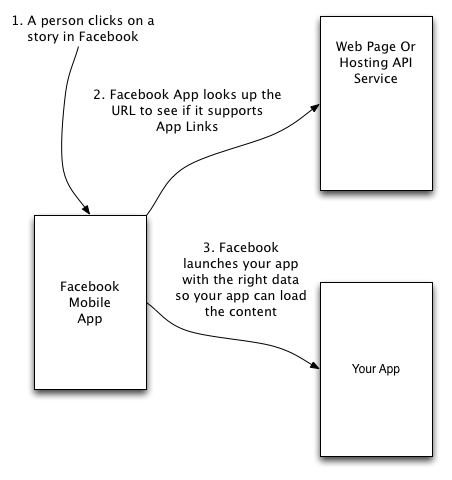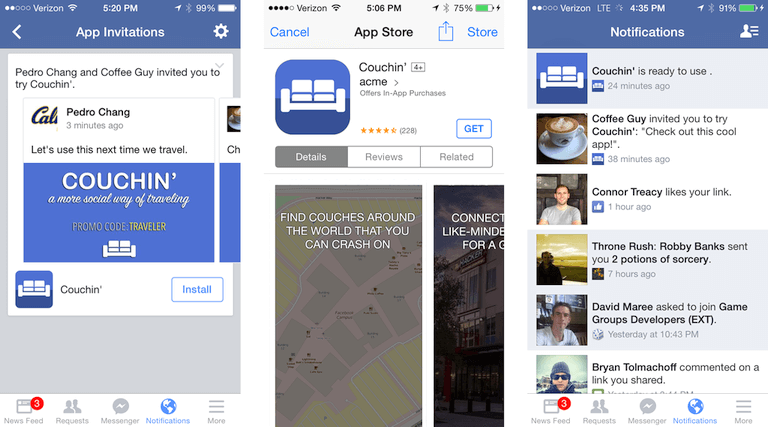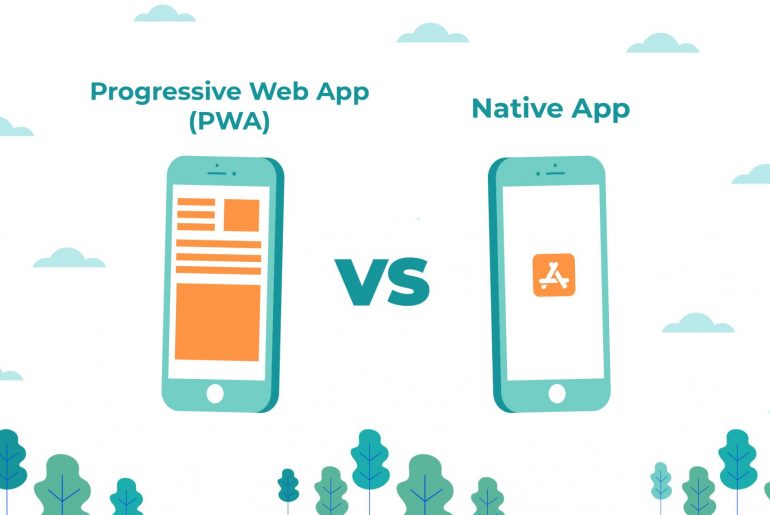Table of contents
Facebook App Links has been here for quite some time, but marketers still somehow struggle to take advantage of this revolutionary solution to the fullest of its potential. And in case you don’t know what App Links is, in this article today, we’ll walk you through its concept, how it works, and how you as a marketer can take full advantage of it.
What is App Links?
“App Links is an open standard to deep link to content in your app”
As introduced by Facebook, app links is an open cross platform solution for deep linking to content in your mobile app. When someone using your app shares content to Facebook or another App Links-enabled app, you can create a link that makes it possible to jump back into your app from that piece of content.
In a nutshell, App Links helps make the plethora of apps that we have right now inter-connected. When users open an App Links-enabled URL, they can be directed to a specific piece of content inside the target app, and this makes accessing content far more easier for the end-users.
How it works
App links offer new opportunities for mobile marketers by allowing them to map their web content to mobile content. The best part is how easy it is to integrate App Links into your mobile app.
For example, here’s a web page with App Link metadata:
<html>
<head>
<meta property="al:ios:url" content="applinks://docs" />
<meta property="al:ios:app_store_id" content="12345" />
<meta property="al:ios:app_name" content="App Links" />
<meta property="al:android:url" content="applinks://docs" />
<meta property="al:android:app_name" content="App Links" />
<meta property="al:android:package" content="org.applinks" />
<meta property="al:web:url"
content="http://applinks.org/documentation" />
</head>
<body>
Hello, world!
</body>
</html>All you have to do is simply add a few tags to associated website content which enables others to link directly into your mobile app. For a mobile-only app without a corresponding website, Facebook offer App Links Hosting API. You can publish your tags to support app links content without having to set up a web server.
One important thing to note is that the App Links standard only works for specific use cases. The destination app must support the App Links standard so that users can be sent to the destination app. When users click on links from Facebook for the destination sites that support App Links, they will be deep-linked to view the app content if the destination app is installed on their devices.
In case the linked app is unavailable, they will be directed to the app store where the app can be installed or a web version of the same page if it’s available. This feature functions on large mobile platforms including Android, iOS and Windows phones.

The importance of a new app-to-app linking standard
Linking is what makes the webs great. App linking gives mobile apps the technology that the web has already offered for several years. It builds a bridge between websites and mobile apps, which boosts mobile app marketing.
Cross platform solution for advertising campaign
In order to create one advertising campaign that works across desktop Web, mobile websites, and mobile apps, marketers only have to add App Links tag to the site. On desktop, Facebook directs user to the website. Meanwhile on mobile, Facebook app routes the user to the app page. This standard simplifies advertising on Facebook and lead to higher utilization of Facebook ad products. App linking helps advance Facebook’s ad business through cross-platform campaigns for websites and apps.
Optimization of user experience
As app stores become completely saturated and the race on gaining user’s attention gets tougher, improving user experience is even more critical to create competitive advantages for your app. Adopting app linking standards into apps can offer your users a more seamless shopping experience. App linking gives every page in the native app a unique link, so that the user can click on a link to access app page immediately. The improved user experience has a significant impact on overall health of the user base. App linking is a must have to optimize user experience.
Solving app discoverability and re-engagement problems
Discoverability in app stores can be a huge problem, and it’s hard to lead potential users to your apps. Studies show that app discovery mostly happens through social recommendation or digital marketing through main channels like facebook. Links posted on Facebook are able to raise awareness and increase app download. Showing users a download prompt for an app when they click on that link can help solve the problem of discoverability.
On the other hand, app installation is just the beginning of your customer life cycle. The challenge is how to get installed users return and remain active within their apps. According to Localytics, 66% of app users only open apps between one and 10 times. To improve this, you can use app links for your mobile app ads. It allows you to lead users to a specific location inside your app, which can be a sale, promotion or specific marketing content. The ability to engage more people on mobile by deep linking them into our app is very powerful.
App linking features for mobile app marketing
App Links are open source, accessible to everyone, and its reference SDKs mean that they can be implemented without going through Facebook. Beyond this, App Links are cross-platform compatible. Extended to work across devices, app links support all major platforms including iOS, Android, and Windows Phone. Facebook provides App Links Index API for apps to discover whether any web URL can be deep linked on mobile. Facebook app links can be utilized for mobile app marketing in several ways:
Facebook shared post
Facebook sharing can be the most powerful form of virality. A potential shared post has the ability to gain massive adoption of a new service or product. App linking makes shared posts much better by enhancing new users’ experiences. Any user with the app installed can be taken to the destination right after clicking on the shared link.
App Invites
Note: This feature is now deprecated
Facebook launched app invites feature to help mobile marketers grow their user base and allows users to share apps to their friends on Facebook. App invite shows up as a personalized and customizable notification to facilitate new users rather than posting publicly. The invite contains a deep link that directs users to the app store where they can choose to download and install your app.

Source: Sending App Invites – Facebook
Facebook advertising
Facebook advertising is a powerful feature which allows for deep linking as well. Not only advertise your app, you can literally direct users to any content or a product within that app. Coupons and other things can be offered to users who have never heard of your app. Facebook ads are placed directly in user’s feed and naturally blend into its content to effectively engage with your customers.
Conclusion
This was, without a doubt, a revolutionary feature from Facebook to help make cross-app communication possible and to the point of effortless for the end-users. And specifically for mobile shopping apps, this is a crucial tool to convert web users into app users.
Here at SimiCart, our native apps do support variations of App Links and Deep Links. With a Magento mobile shopping app from SimiCart, you could work to bring more customers from your online store to your native app, consequently growing a loyal customer base with an engaging app optimized for conversions.






